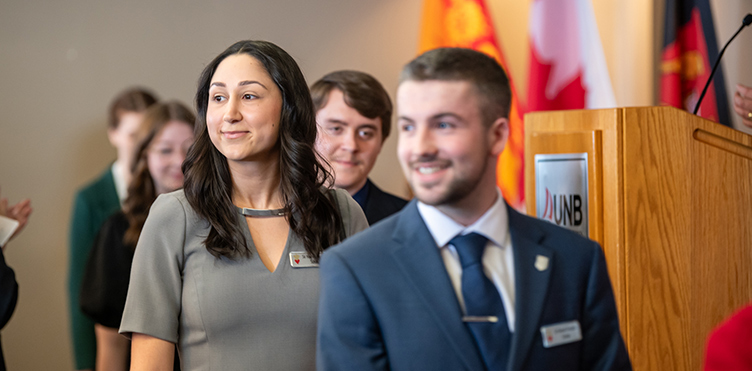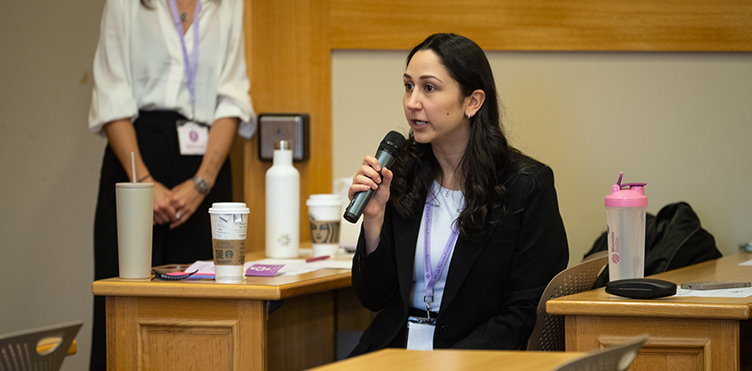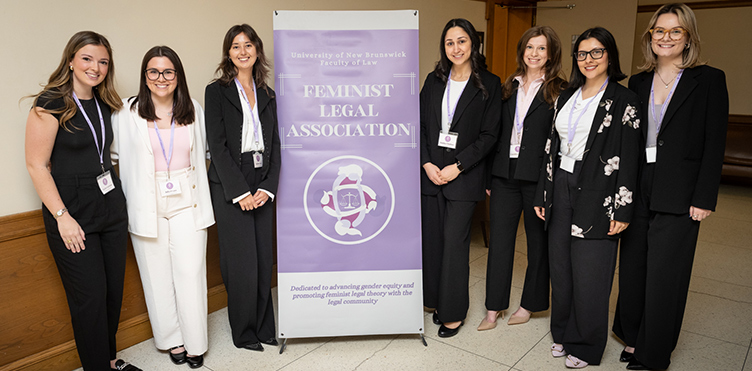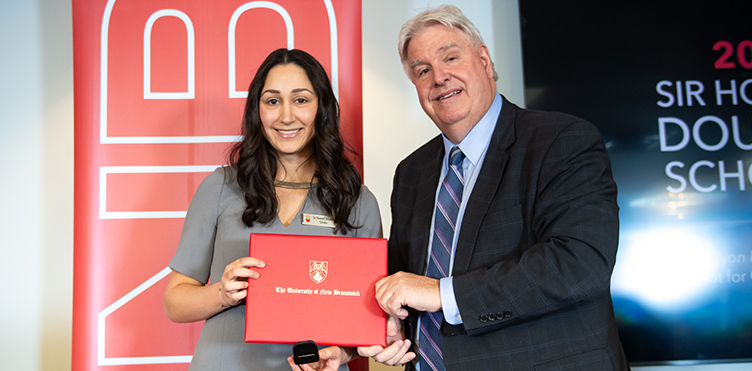
When Dahlia Chahine (JD’25) crossed the stage at UNB’s 196th Encaenia this spring, she did so with pride, purpose, and a record of achievement that spoke volumes. Among the top students in her class, Dahlia earned her JD with distinction—an academic accomplishment matched only by her deep commitment to student life. Widely regarded by her peers as a natural leader, she made a lasting impact on the UNB Law community through her tireless involvement, thoughtful leadership, and unwavering dedication to service. Her contributions were formally recognized with her induction into the prestigious Sir Howard Douglas Society—an honour reserved for students who exemplify academic excellence, leadership, and community engagement.
Born and raised in Halifax, NS, Dahlia earned her undergraduate degree in Business Administration with Honours at Acadia. After graduation, she returned home and worked as a paralegal, where her fascination with the legal world quickly grew. That experience inspired her to write the LSAT and pursue law school. Convention might have pointed her toward Dalhousie, close to home and familiar—but something about UNB Law stood out, something urged her to take a chance on a place she’d never even visited.
“UNB Law is a small school, and I’ve always thrived in small-school environments,” shares Dahlia. “The sense of community here cannot be beat.”
What surprised her most about UNB Law was how many doors opened once she arrived. From internships to student government to advocacy groups, she found opportunities to learn and lead at every turn.
“UNB Law’s focus on experiential learning really stood out for me. I'm such a big advocate for these types of opportunities; they not only shaped my experience at law school but also my career trajectory.”
One of the most transformative experiences of Dahlia’s time at UNB Law came after her first year, when she applied—on a whim—for an internship with Public Prosecutions. Although she wasn’t sure criminal law was for her, she (again) followed her instincts.
“I went from being unsure about criminal law to discovering a real passion for it,” she says. “Through the internship, I found a mentor, gained courtroom experience, and eventually secured both a summer job and my articling position.”
This internship program provides students with an opportunity to develop an understanding of the role of the Attorney General as a prosecutor by working with the staff of the Director of Public Prosecutions. Students are exposed to prosecutorial ethics, advice to investigators, pre-charge screening, disclosure issues, trial issues, sentencing and dealing with witnesses and victims.
“It’s a truly unique opportunity. You go to court and observe real proceedings and debrief with the prosecutor both before and after,” says Dahlia. “I was also really fortunate to work with Patrick McGuinty (LLB’18) and be able to observe his work at the Court of Appeal. He is so deeply interested in helping students who are passionate about criminal law; he really takes you under his wing.”
The internship led to Dahlia working with McGuinty as a summer student after 2L. She credits the UNB Law community for making that experience possible.
“I don’t think another law school could have given me the same kind of access to mentorship. Our size and location—that’s something really special about UNB.”

Dahlia’s leadership journey didn’t begin in law school—it’s been part of her story for years. Her involvement in student government dates back to middle school and continued through her time at Acadia, where she served as the student representative on the university’s Board of Governors. So, it was no surprise that when she arrived at UNB Law, she hit the ground running, serving as a Faculty Council representative in both 1L and 2L.
“I think some people are just really drawn to it. Faculty Council was a position that I felt had real, meaningful impact behind it—you're in a room with people who can actually do something about the issues you bring forward. That was a really important space for me to feel like an advocate for everyone else in my year, and a space where sometimes student views can be missed.”
In her final year of law school, Dahlia was elected Vice President of the Law Students’ Society (LSS), where she again served her community with distinction. In this role, she guided students through the formal recognition of new clubs and societies, championed student-led initiatives, advocated on behalf of her peers, and stepped in wherever she was needed. When UNB Law’s annual charity auction needed someone to take the lead, Dahlia didn’t hesitate, stepping up and organizing one of the most successful student-run fundraising nights ever.
“It was one of those moments where you really feel the power of community. We had so many generous donations from the public and from our professors. We filled the room, over 100 students came out and raised over $7,700 for the Women in Transition House and the Fredericton SPCA.”

In addition to her work with the LSS, Dahlia played a key role in expanding the impact and presence of the Feminist Legal Association (FLA) at UNB Law. After serving as an executive member in 2L, she stepped into the role of co-president in 3L, alongside classmate Marina Luro (JD’25).
“Marina and I really saw this as the opportunity to be involved in something greater than ourselves, greater than the law school. Something that would affect all of us in the legal community.”
Their mission was clear: create engaging and thought-provoking programming that connected students to broader conversations in the legal world. In short, challenge, educate, and empower. And they delivered. From a self-defence class for women to a breakfast fundraiser for Grace House, to annual golf lessons designed to break down barriers in the legal profession—the FLA created space for advocacy, learning, and empowerment.
Their year culminated in a landmark event: the return of the Law Needs Feminism Because… conference, a national initiative that had gone dormant during the COVID-19 pandemic.
“We wanted to bring it back in a way that felt meaningful,” Dahlia explains. “We wanted to do something bigger; to make an impact on the student body as leaders of the FLA and put a focal point on why we are here and why our group exists.”
The conference was a resounding success, drawing over 100 attendees and sparking dynamic conversations at the intersection of law and women’s rights. The event featured a powerful lineup of speakers, including Dr. Suzanne Zaccour, Director of the National Association of Women in the Law; Dr. Rashmee Singh (University of Waterloo), a leading academic in feminist legal theory; and Justice Sudaba Yameen, a former judge from Afghanistan and a fierce defender of women’s rights.
“To see a room filled not just with women, but with men, parents, and people from across the community—it reminded me that this work matters,” reflects Dahlia. “That’s how cultural shifts begin.”
For Dahlia, the Law Needs Feminism Because… conference, and others like it, serve to highlight the structural and hidden challenges faced by all women in society.
“These are critical discussions,” she explains. “As women in law school, we need to understand not just our own barriers, but also those faced by the marginalized communities we’ll represent—communities that experience higher rates of violence and discrimination. There are deep structural issues, and by starting these conversations, we can push for collective action, policy change, and ultimately a broader cultural shift. A conference like this is a powerful place to begin.”
Reflecting on the event’s success, Dahlia emphasized the collaboration and community spirit that made it all possible.
“It was a true team effort and incredibly inspiring to see so much of the legal community rally behind this initiative. We couldn’t have done it without the support of our sponsors—the Faculty of Law, the UNB Alumni Association, Stewart McKelvey, McInnes Cooper, and the CBA New Brunswick Branch—or our amazing FLA team. Jasmine Kour, Caroline Fischer, Julia Evans, Taylor Gorman, and Ashlee Morgan were some of the most incredible people I’ve ever worked with.”

As a Sir Howard Douglas Scholar, Dahlia has now joined an exclusive group of just over 300 UNB graduates to receive the honour since its establishment in 2006. The news of the award came as a big surprise—but a deeply meaningful one.
“UNB is filled with incredible students doing amazing things, across all faculties,” she says. “To be recognized not just for academic performance, but for the work I’ve done outside the classroom—it meant the world to me.”
The honour also validated the values she’s held since childhood: leadership, service, and standing up for what matters.
“It was the perfect way to end law school—and a reminder to carry that energy forward into my career.”
As she begins her articling with Public Prosecutions in Fredericton, Dahlia is keeping her next steps open. But one thing is certain—she won’t be saying goodbye to UNB Law anytime soon.
“For me, leadership and advocacy aren't just about the titles or the accomplishments, it's about the day-to-day work of showing up, caring and contributing meaningfully to the community, and I feel like that's the approach I've tried to take throughout law school and it's an approach that I'll continue to try to take as I move into my career. I know I'm not saying goodbye to UNB Law when I graduate because of the impact it's had on me. I feel a pull to stay involved and try to give back as much as I can to this place because it's given me more than I could have ever imagined.”
Dahlia’s journey at UNB Law is a testament to the Sir Howard Douglas Society’s guiding principle: Non Nobis Solum: Not for Ourselves Alone.